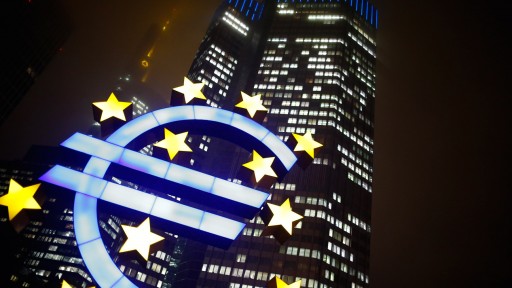- Home
- >
- >
- ECB faces crucial test of ‘whatever it takes’

ECB faces crucial test of 'whatever it takes'

The European Central Bank faces a crucial test of its resolve to do "whatever it takes" to preserve the euro when it decides this week on buying government bonds to combat deflation and revive the economy.
The EU top court's adviser and the Swiss National Bank have smoothed the way for quantitative easing (QE), or printing money, but fierce opposition from Germany's central bank, politicians and public may yet shackle the ECB.
News that ECB President Mario Draghi met German Chancellor Angela Merkel privately last week highlights the acute political sensitivity of the decision. While the Bundesbank is opposed to the policy, which it sees as a back door to monetary financing of feckless governments, creating potential liabilities for German taxpayers, the ECB is hoping Merkel won't denounce it and will restrain her conservative allies.
Some QE supporters fear Draghi may make too many concessions to Germany by framing a program that is limited in volume and scope, doesn't share risk across borders and excludes buying bonds of countries with the lowest credit ratings.
Economists distinguish two main ways in which QE, already used in the United States, Britain and Japan, works to revive an economy and raise prices - the "signalling effect" and the "portfolio effect".
In layman's terms, the former describes an unambiguous message to financial markets that a resolute central bank is determined to use unlimited resources to achieve its goal. The U.S. Federal Reserve is the frequently cited model.
"Just as markets know never to fight the Fed, they need to understand that you don't bet against the ECB," said a senior Eurosystem official, who is not authorized to speak publicly.
The latter term describes the mechanism through which a central bank creates money to buy bonds from banks, insurers and pension funds, who reinvest it in higher-return assets such as stocks or corporate bonds, often outside the euro zone. That exit of funds lowers the exchange rate, making exports cheaper and imports dearer, hence raising the inflation rate.
The euro has already fallen from nearly $1.40 in May 2014 to $1.15 last Friday, its slide gathering pace as expectations mount that the ECB will launch QE.
Switzerland's central bank lifted a hand-brake on the euro's fall last week when it abruptly abandoned a three-year-old cap on the Swiss franc's exchange rate, which had forced it to buy tens of billion euros to defend the peg of 1.20 to the euro.
The shock move, which sparked global currency turmoil and inflicted heavy losses on some banks and brokers, showed how hard it is for central banks to tame volatile markets and how easy long-accumulated credibility can be put at risk.
That carries lessons for the ECB as it contemplates one of the toughest decisions in its 16-year history.
 Varchev Traders
Varchev Traders If you think, we can improve that section,
please comment. Your oppinion is imortant for us.






